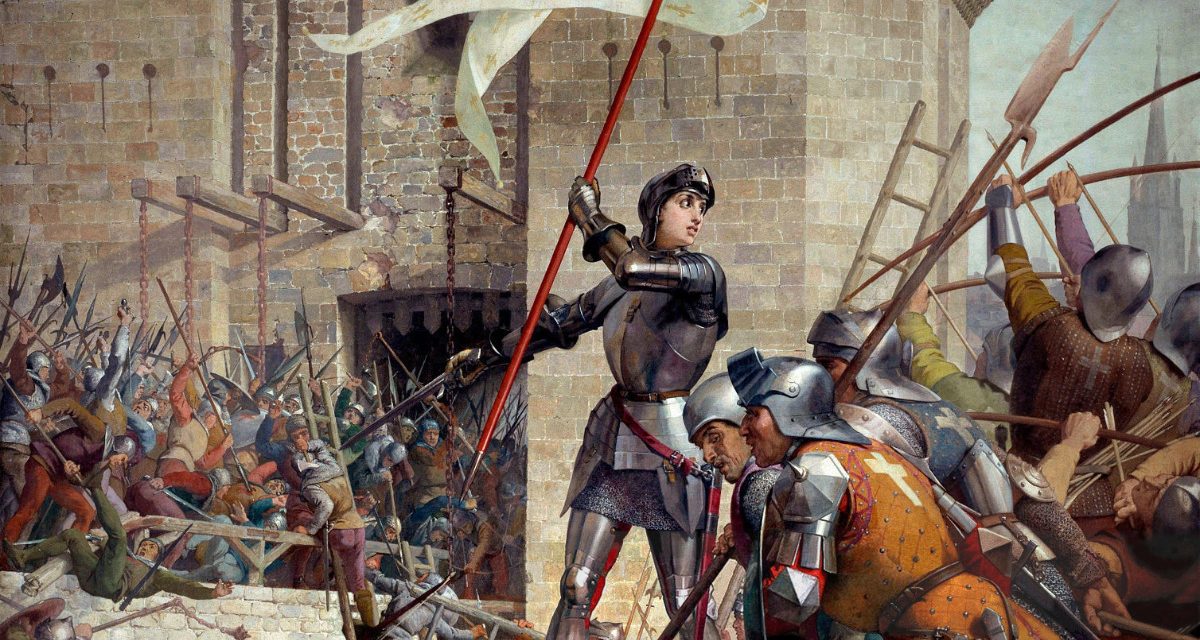It’s the story of David and Goliath, it’s the story of Frodo and the Ring, it’s the story of Jesus and the Cross.
Today is the feast of St. Joan of Arc, my patroness. Since her feast isn’t on the universal calendar, it used to often go overlooked. These days, I’m always surprised by texts throughout the day wishing me a happy feast day. In some ways, it shows how “trendy” Joan has become. But like so many of the saints, do we really know Joan? Or do we know bits and pieces of her story, perhaps the shocking or the glamorous ones, but miss the actual imitable aspects of her life?
Joan’s mission seems so different from mine. Her story is a bit mysterious and confusing. How do we emulate Joan? I’m not receiving visions, and God certainly isn’t calling me to lead an army. What does her story have for me in my daily life?
While I could write a series of articles about the virtues of Joan, today I want to focus on an aspect of her that is most overlooked: Her meekness.
What is Meekness?
Blessed are the meek, for they will inherit the land. (Mt 5:5)
Joan certainly did inherit the land! But perhaps meek isn’t a word that you would use to describe the warrior saint. We probably think the bumper sticker “Well-behaved women rarely make history” better describes her.
But we misunderstand meekness, equating it with weakness. Is Jesus saying that the weak will inherit the land?
The Greek word for meek is used for a wild animal that has been tamed. St. Thomas Aquinas said that “meekness makes a man self-possessed.” This is not weakness. On the contrary, it is true power. A wild stallion that has not been tamed does damage with its strength. When a stallion has been tamed, it has a power that is life-giving and accomplishes great things. Its strength, because it is controlled, is powerful.
It’s the same with meekness. To possess oneself does not mean that we are weak and ineffective. Rather, we are powerful. To posses oneself means you react properly to the situation at hand. You are not lifeless or unresponsive, but you don’t fly off the handle either.
To be meek doesn’t mean to be passive, weak, or without emotion. These aren’t virtues. The virtue is found between two extremes. Meekness moderates our anger. Bishop Arthur Serratelli noted that meekness “stands between becoming angry at the wrong things and not becoming angry at anything.”
The meek do not allow themselves to be controlled by their emotions, but they don’t lack emotions, either. They know how to respond to evil. The meek person does not seek revenge, but faces adversity with courage and resilience and trust in the Lord.
The thing everyone knows about Joan is that she fought for the Lord. She leapt into the battles. She pulled an arrow from her own chest! But she did not do so out of anger or spite. When Orleans was liberated, Joan broke down in tears after the battle, weeping for the English soldiers who died. She wrote to the Duke of Burgundy (her enemy) on the day Charles’ crowning and urged him to make peace, telling him, “Forgive each other with good heart entirely as must faithful Christians do …”
She did not will anything other than what the Lord willed. Even at her death (where she fought very human emotions of fear and repulsion towards the thought of being burned at the stake), she asked those gathered to pray for her. She publicly forgave them the evil they had done to her. And despite all reasons to run the other way, she stayed faithful to the Catholic Church until the end. She did not curse or seek revenge.
Our society needs less anger over petty things, less division over silly things, and prudence, discernment, and charity. We need to get angry over the sin we see in the world and the injustice, but we need to have compassion and love for the sinners.
Trust in the Lord
Joan is a remarkable example of trust in the Lord. She trusted when every turn of her life was shrouded in mystery. She trusted him when he first called her, and she trusted him when she was on trial. Joan is a reminder to us to trust God while the story is being written.
We don’t know the whole story in even our own lives! We don’t know what the Lord is doing. Joan is an example to us to stand up for truth, to face persecution, gossip, and detractors with courage, but to ultimately trust in the Lord. We are not the judges of mankind. He is. And to accept that requires meekness and surrender.
We are faced daily with the problems in the world and the problems in the Church. Our temptation is to grow angry and to rail against them, to gossip and point fingers. We are easily stirred up to hate and divide and to encamp ourselves in our own little spheres of self-righteousness.
What our world needs more of is meek souls who have self-mastery. The world needs men and women who are willing to fight against injustice, but at the end of the day, step back and recognize that there is a God, and we are not Him.
It is not a call to be passive, but to face adversity with charity and trust.
Meekness, not Weakness
To the world, meekness will perhaps always look like weakness. The world will tell us that trusting in the Lord, surrendering to his plan, is weak. Those of us who have attempted to do so know that such trust and surrender requires great courage.
The world does not understand Joan, and will constantly try to paint a different picture of her, because they did not understand Christ. There’s one statement she made during her trial that is the key to Joan.
She was asked, “Why you rather than another?”
She responded: “It pleased God thus to do, by a simple Maid to drive out the King’s enemies.”
It’s the story of David and Goliath, it’s the story of Frodo and the Ring, it’s the story of Jesus and the Cross.
“Rather, God chose the foolish of the world to shame the wise, and God chose the weak of the world to shame the strong, and God chose the lowly and despised of the world, those who count for nothing, to reduce to nothing those who are something.” (1 Cor 1:27-28)
Let us emulate the Maid, Joan.
Image credit: “Joan of Arc at the Siege of Orléans” Eugène Lenepveu, Public domain, via Wikimedia Commons
Please share Joannie’s post with family and friends on Facebook and other social media.
Please help support our outreach!
We are grateful for our donors who make this labor of love possible…
We welcome both one-time and monthly donations. A monthly subscriber giving just $10 a month will help cover the cost of operating Integrated Catholic Life for one day! Please help us bring enriching and inspiring Catholic content to readers around the world by giving today. Thank you and may God Bless you for supporting the work of Integrated Catholic Life!














